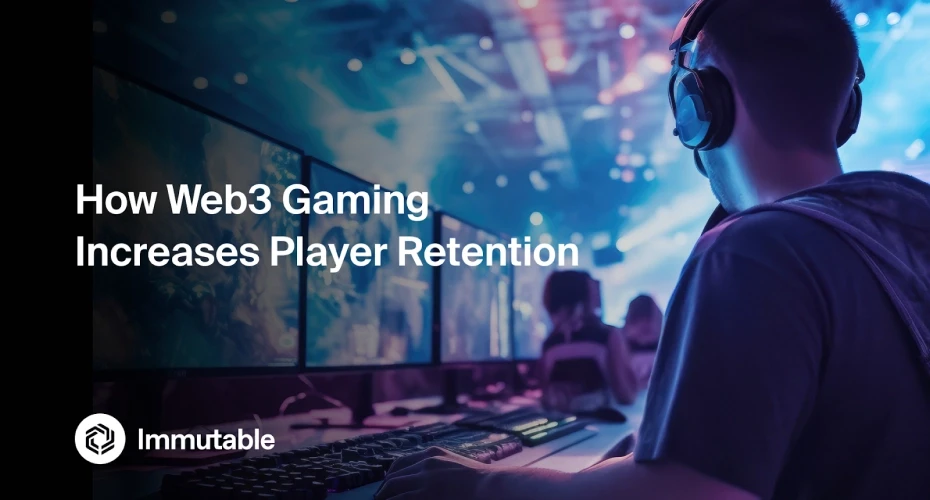Company News
How Web3 Gaming Increases Player Retention
Apr 10, 2024



More than 40% of web3 gamers spend more than 10 hours playing web3 games every week.
Compared to the highest average weekly playtime 7.5 hours for traditional games, it's clear that web3 gamers really love playing web3 games.
From a player’s perspective, web3 games provide players with true ownership of digital assets – digital property rights – unlocking the freedom to buy, trade, sell those assets.
However, as a game developer, integrating true ownership of digital assets can seem puzzling at first. Why would you relinquish control over in-game assets to the player?
The answer is simple: providing players with a sense of ownership over their items boosts their identification and engagement with your game, leading to better retention.
More and more studios are turning to web3 gaming as the blue-ocean opportunity to diversify revenue streams and increase player retention.
So let’s illustrate how web3 gaming can boost player retention with a case study of two of our flagship web3 games: Gods Unchained and Guild of Guardians.
Gods Unchained players spend more time and money in-game compared to traditional online TCGs
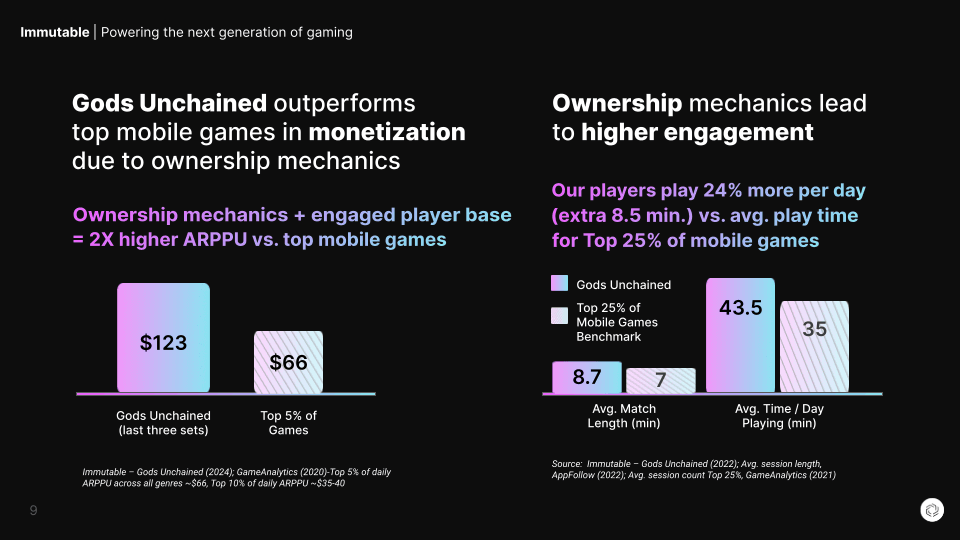
Launched in 2018 and with 52 million worth of cards already exchanged, Gods Unchained (GU) is a free-to-play, play-to-earn TCG built on Ethereum. Players choose to play as six different gods, each with their unique powers and playstyles, to outsmart their opponents by building card decks that can combat a wide variety of tactics.
Unlike traditional TCGs, where players grind for hours to gain the best decks yet only ‘own’ their cards provided they have access to the game servers, GU lets players own their cards as NFTs.
Cards can be earned through daily gameplay and traded on marketplaces for other cards or sold as ETH.
Unique gameplay mechanisms like crafting give players the power to create exclusive, higher-rarity cards that further increase their intrinsic value – highlighting the new revenue opportunities unlocked by web3 technology.
With Web2 games, a typical monthly average revenue per user of $20-30 is considered high, and for newly released titles, that could go up to $80-120 in the first weeks and months post-release.
Our data from Gods Unchained shows that web3 gamers transact over $130 monthly, sustained over the years, while playing 24% more daily than the top 25% of mobile games.
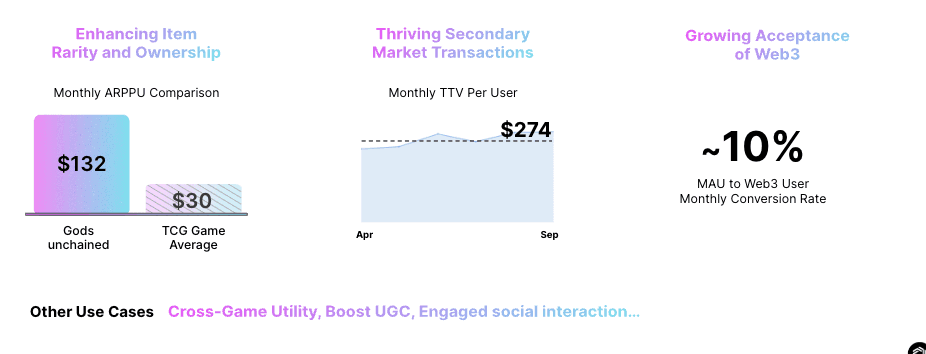
web3 gamers are also willing to make more transactions than Web2 gamers – signaling to developers that web3 users are willing to buy and trade more items.
Another testament to GU's success is the monthly active retention rate, which stands at an astounding 95%. This signifies that our core users are genuinely engaged and are inclined to stay with the game.
The data is clear – web3 games create new retention strategies beyond traditional gaming models. Our next flagship title, Guild of Guardians (GOG), further reinforces this idea with its bombshell Friends & Family demo launch.
Guild of Guardians demo launch had overwhelmingly positive feedback and impressive player engagement results
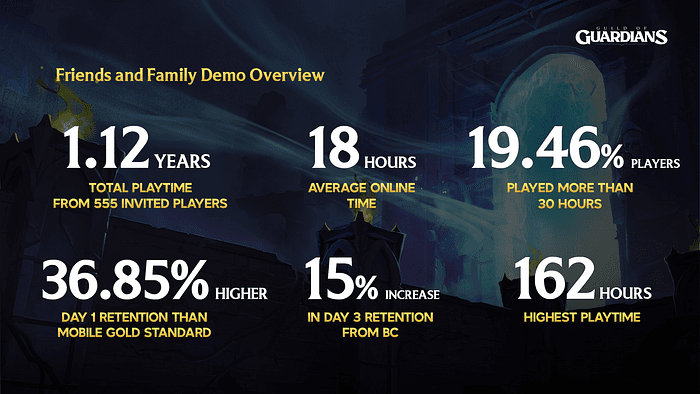
GOG is a mobile RPG where players work together to build their dream team of Guardians and compete in guilds to progress and achieve common goals.
The Friends & Family launch saw 555 participants commit over 1.12 years of playtime to the week-long demo. The results after analysis were jaw-dropping.
Day 1 player retention sat at 65% and finished at 43% on Day 7. Comparatively, traditional game launches average 29% player retention on Day 1.
The game's emphasis on community and teamwork also fueled player retention as users formed bonds to pursue their shared in-game objectives.
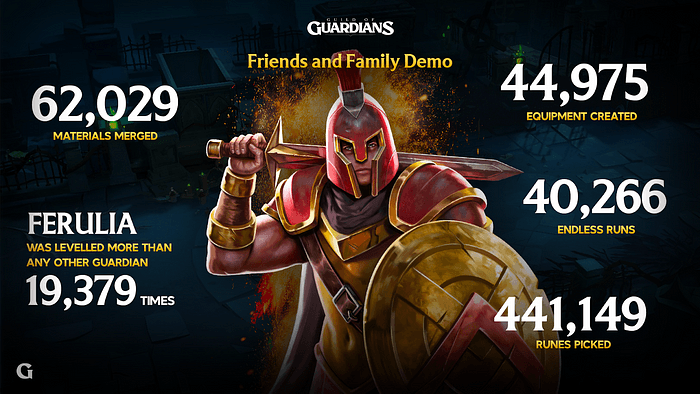
Players can also benefit financially from their in-game achievements and playtime. With GOG's recent migration of NFTs to Immutable zkEVM, players can now own, trade, and sell their in-game characters and items through secondary markets – and as illustrated by the amount of digital assets created in the graphic above, the earning potential for gamers and developers is significant.
web3 gaming gives you the tools to boost player retention – and the best place to build is on Immutable
By providing players with real ownership and community-driven gameplay, games like GU and GOG are setting a precedent for how to maintain and grow a dedicated player base in the web3 gaming space.
Immutable provides developers with powerful tools, a wide range of features, and a robust ecosystem to design, build, and launch high-quality web3 games with speed, ease, and security.
The platform's end-to-end solution includes APIs and SDKs with easy-to-understand abstractions, allowing developers to focus on creating engaging gameplay experiences without needing to be experts in blockchain technology.
We also offer a suite of products enabling game developers to boost player retention and increase revenue-generating opportunities for their games.
The Immutable Passport streamlines the onboarding experience for players while offering them a secure digital wallet, protection against fraud, and seamless authentication across web3 games and marketplaces.
Global Orderbook enables players to truly own, buy, trade, and sell their in-game items as NFTs, effectively increasing demand and liquidity for in-game assets.
By leveraging Immutable's platform, developers can create engaging, secure, and scalable web3 games that offer true digital ownership and innovative monetization strategies, all of which boost player retention.
Start building the games of the future today.
